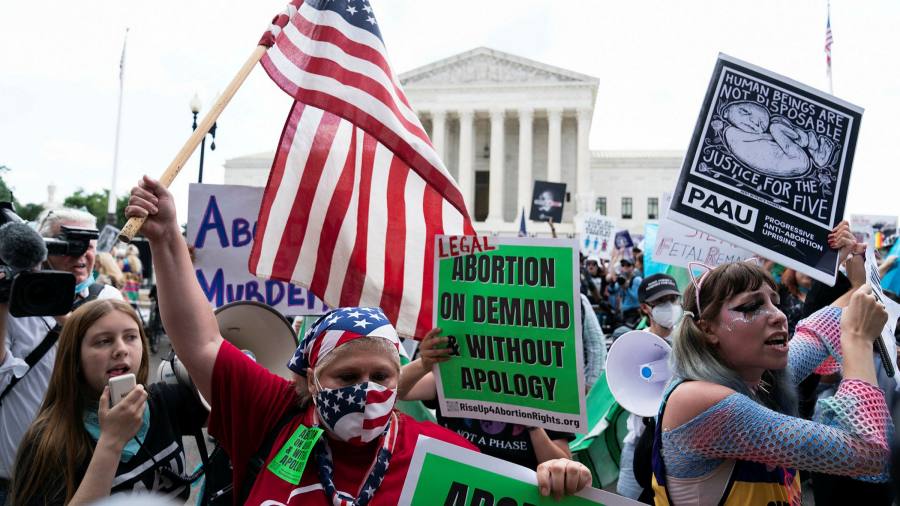The US Supreme Court’s reversal of the constitutional right to an abortion has handed an instant challenge to business leaders, caught between their fear of reprisals for taking sides on a polarizing topic and their employees’ dependence on company-issued health insurance.
“The ultimate result is chaos for employers that typically operate in multiple states,” given the expectation that many states will now pass sweeping abortion bans, said Jen Stark, co-director of the center for business and social justice at BSR, which advises businesses on how to navigate their social responsibilities.
Few executives reacted publicly to Friday’s news, despite having had weeks to prepare after the draft decision to overturn the 1973 Roe vs Wade ruling was leaked to Politico this spring.
Michael Bloomberg, founder of the eponymous financial data group, described the ruling as “the worst attack on the rights of American women in generations”, while Danny Meyer, the restaurateur behind Shake Shack and Union Square Hospitality Group, called it “appalling and unfathomable”.
Several companies have signaled in recent weeks that they would try to avoid making such public remarks, pointing to polls showing continued opposition to abortion among a vocal minority of Americans.
An NPR/PBS NewsHour/Marist poll last month found that one-third of Americans supported overturning Roe vs Wade, and companies from Bank of America to Levi Strauss have described the topic of abortion as a “fraught” or “tough” one.
Instead, as one senior executive told the Financial Times before the Supreme Court confirmed the leaked verdict, most big companies plan to respond with “competitive pay and benefits”.
That is likely to mean that many employers follow the lead set by the likes of Amazon and Citigroup, which have promised to cover travel expenses for staff needing to travel out of state to access medical procedures, including abortions.
Meta, the owner of Facebook, said it planned to reimburse travel expenses for employees who needed out-of-state treatment “to the extent permitted by law”, but added that it was still “assessing how best to do so given the legal complexities” involved”.
“As always, we’re focused on the health and wellbeing of our employees, and want to ensure equitable access to all benefits,” JPMorgan Chase said on Friday.
Box, the cloud storage company whose chief executive called the Supreme Court’s ruling “shocking”, said it would support paid time off and cover travel and medical expenses for employees needing to access “critical reproductive health services”.
Those stances have already generated a backlash against some companies, however.
After one shareholder accused Citi of “a gross misuse of funds” to support something which many shareholders found “morally objectionable”, the bank’s chief executive Jane Fraser told its annual meeting in April that its policy “isn’t intended to be a statement about a very sensitive issue” and that it respected all views on the subject.
BSR’s Stark said that expanding benefits to cover paid sick leave and travel stipends would be seen as “the new floor for large employers”: an expectation among current and potential employees of the minimum benefits companies should provide.
Citing recent polling from the Society for Human Resource Management, she added: “Even if we don’t see dozens of public statements from companies in the next 24 hours, we do know they were readying their internal policies and practices to mitigate the harm. ”
Several supporters of abortion access, such as the Don’t Ban Equality coalition of companies including J Crew and Tinder, have also cited an economic case for it. One study by the Institute for Women’s Policy Research found that abortion restrictions cost the US economy $105bn a year by reducing women’s participation in the workforce.
Last month, Treasury secretary Janet Yellen Detect that eliminating abortion rights “would have very damaging effects on the economy and would set women back contracts”.
San Francisco-based Levi Strauss on Friday dubbed the protection of reproductive rights “a critical business issue impacting our workforce, our economy, and progress toward gender and racial equity”.
In their dissent, justices Stephen Breyer, Sonia Sotomayor and Elena Kagan noted that a 2020 study found that only one in five private-sector workers had access to paid family leave, including just 8 per cent of those in the bottom quartile of wage earners.
Steve Case, the co-founder of AOL whose revolution venture capital firm focuses on entrepreneurs outside the biggest US tech hubs, highlighted the prospect that smaller companies would also be affected.
Start-up communities in many states were “worried that this development could impact their ability to continue to win the battle for talent” at a time when employees can work remotely, he said in a tweet.
Companies have also been drawn into the abortion debate by increased scrutiny of the role played by corporate political donations, which has generated shareholder questions at the annual meetings of AT&T, Anthem and other companies.
One campaign group, UltraViolet, calculated recently that 112 of the 250 largest US companies had contributed to the campaigns of legislators who sponsored new abortion bans and restrictions in 2021.
Companies should brace for more pressure as Republicans weigh further restrictions on abortion access, BSR’s Stark warning.
“The fall of Roe is just the end of the beginning,” she said. “Companies in America have become this firewall when it comes to mitigating the harm of extreme social policy in the states.”
Additional reporting by Hannah Murphy in San Francisco and Joshua Franklin in New York

